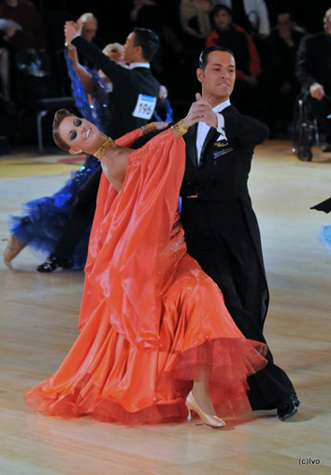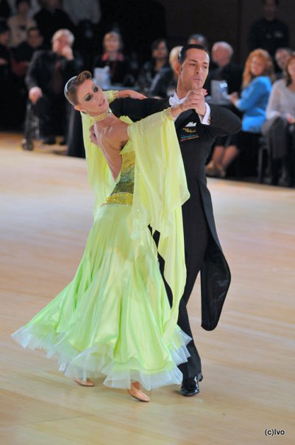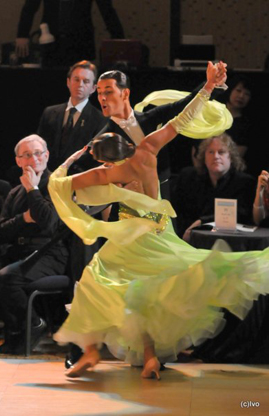Interview with Simone & Annette – Part 2

Photo courtesy of Ivo Dimitrov
Annette: It’s a combination of both.
Simone: I think we are not a sport. We need to be prepared as a sport. The body has to be prepared to be performing, but I see much more the performance together with art instead of performance together with sport. It’s much more that when we go onto the floor we have the performance. We are not sportsmen. Otherwise, we would not go into the hall with tailsuit and pretty dress.
Annette: We would come in a tracksuit or whatever. It’s not about going faster or jumping higher. But of course the body has to be prepared.
Clara: What other things do you do besides dancing to prepare your body?
Simone: We do exercises.
Annette: We have a small group of people who are actually from the Olympics and work with a lot of sports at the Olympics. They sometimes come.
Simone: They do some tests, take some blood, measure the amount of oxygen we are using… They are checking everything. This we are doing ourselves, so we pay everything ourselves.
Joel: So it’s not by the German DanceSport Federation?
Simone: Unfortunately, no.
Annette: We want to be ahead of other competitors, to have done everything for our dancing… everything from the dress to physical conditioning.
Simone: We try to do the best in the time we have.
Joel: Does the DanceSport Association help you a lot?
Simone: They help. It was not like it used to be. Because of the country’s television, there was a lot more money before. We had the Master Gala, the first channel in Germany…
Annette: But in general, in comparison to other nations, it’s good.
Simone: They pay some flights, and sometimes they give awards for the results that you get. So the better you dance, the better results you get, the more money you get.
Annette: We are listening to all the other competitors as well. I think Japan is still the best money-wise, then Denmark.
Simone: Italy as well. They are becoming better… and then Germany as well. There are some countries that don’t even pay even the flights to go to the World’s.
Joel: Yes. Like in Canada. We had to pay our own flights back when we went to the World’s.
Simone: So actually, we say to ourselves that we are lucky.
Joel: But of course the Association doesn’t pay for you to go to the majors, like Blackpool or the UK.
Annette: No. That’s why one year we did 52 competitions to get the prize money and help pay for all the lessons and travel.
Simone: We have to do this. It is our choice. We don’t want to teach too much because we can teach afterwards. Now is not the moment to teach, it is the moment to practice. Because we have maximum another 7 years, then we have to let it go. Afterwards, we cannot do any competition, we can only teach.
Clara: Do you mind if we share with everyone how old you are?
Annette: I’m 26 and Simone is 27.
Simone: We are the young generation together with Emmanuel and Tanya, Federico Di Toro, and Yang Chao who now made the final at the UK. We will be the next generation trying to challenge for the title.
Clara: How do you deal with the pressure of keeping your spot in the final?
Annette: You always have a time that you lose or don’t lose. If the comp is really good you have a good result, it is possible you have a bad result, but this is life.
Simone: You just go. In the end, it doesn’t matter if we lose one competition. It’s the final goal that’s important. We can lose today; we can lose tomorrow or the day after tomorrow. Our goal is to win in the future, one day.
Annette: You just have to take it as an experience sometimes. You can have a very good day and a good result. Sometimes you could have a really bad day, feeling-wise, and the result is still good.
Simone: But then you don’t go to sleep so good.
Annette: One time we finished the comp and went straight to practice because we were not happy with the way we danced.
Simone: There was nothing wrong with our result, but we didn’t like our dancing, so we went back to practice and said, this went wrong, this went wrong, this went wrong…

Photo courtesy of Ivo Dimitrov
Simone: (points to Annette, smiling)
Annette: It is really the German mind. (nodding in agreement)
Simone: We have a good combination. Annette is the one who plans everything. If she wants to do something, she knows the way she wants to have it. We have to do this, this, this, to have this one. And I’m more the feeling way. I’m more the Italian style. The character that I’m trying to reach, in which way, how… Annette has the plan, and I give some taste to it. (Simone gestures with his hands, true Italian-style.)
Annette: It is a very good combination. You see a lot of Italians dance with foreign ladies. Only Italian or only something else will always be missing some part.
Joel: How long have you been dancing together?
Simone: 5 and a half years.
Joel: And who was it that put you together?
Annette: Both William and Oliver.
Simone: Yes, I called Oliver and then she came to Italy make the first try, and it was a complete disaster. It was a total disappointment! I looked at William and said, “It’s not going to work.” And Annette as well was completely unhappy. We really felt not made to be together. William said, “Well why don’t you have a lesson with Oliver?” And I said, “I don’t see the point.” Actually, Oliver used his magic fingers… touching something, adjusting something, and then we practiced the same day for 6 or 7 hours.
Annette: We had the first routines done on the same day.
Simone: We changed it from black to white. We don’t know how we managed, but it worked.
Clara: Wow! Thank goodness for Oliver’s magic fingers!
Joel: What does a typical practice look like for you guys?
Annette: It really depends on which period.
Joel: Let’s say a month or 2 months before Blackpool?
Simone: 2 months before, we are still working on something like technique, like musicality. If we come up to 2 or 3 weeks before, we do a lot of simulations.
Annette: Going through 100 million times. If it’s 2 min 10, we do 2 min 40, until we die.
Simone: The body has to be prepared. If the body does enough of it, then it will recognize it, and then we will not be scared when we go there on the floor.
Annette: I think it’s a stupid thing not to be prepared physically. It’s the easiest thing. Everybody can go into the ballroom and practice 2 min 10. Stamina should be always there.
Simone: Nobody likes to suffer, but better to suffer outside than inside the competition.
Clara: Yes. That’s what we always tell our students. They complain when we do only 1 min 45 in our stamina practice. But now, I think we’ll have to bump it up…. (smiling)
Joel: So how do you prepare for Blackpool or the UK? The ballrooms are always packed in London, how do you keep your stamina?
Annette: We rent a top secret ballroom!
Simone: Cheam [the studio in London that everyone goes to before the majors] is a really good practice if you want to have the feeling. It’s not really a practice.
Annette: It’s more like a demonstration.
Simone: If you want to practice in a chill-out mode. Because you have the other couples, everybody’s watching, so it’s interesting to see, but it’s not a real, real practice.
Annette: And it’s also too busy. You might do 2 Waltzes, 2 Tangos… no sweat.
Simone: Sometimes you need that as well… because if you do only stamina, you will end up like a robot. It’s always about balance.
Joel: So if you weren’t dancing, what would you be doing?
Simone: No idea.
Annette: I always said I wanted to study medicine. Actually, I finished school, so this was the big plan, to go to University and study medicine… and then came Simone.
Simone: I ruined the plan. (laughing) For me, I love the music… I love to sing as well. I’m not really good at singing, but I was playing an instrument… so something like a band or something… something with music.
Annette: I finished 13 years of school and then went 1 and a half years of military service. I was in a special sports company inside the military.
Simone: She doesn’t look like it, but she’s really dangerous. (smiling)
Annette: It was really tough, but a nice experience as well.
Joel: So apart from Vancouver of course, where is your favourite place to compete?
Simone: We love to compete in Japan. It’s organized well. Germans, we always like when things are organized. Coming to Vancouver also, there is always someone waiting at the airport.
Annette: You get your package, you know when you have to be ready… sometimes you don’t have this.
Simone: For us this is a big help because we are not under stress. We don’t have to search for it. We don’t have to make 2000 calls, what time is the round… So it’s well organized here, it’s well organized in Japan.
Annette: We depend on the audience a lot. If the audience is warm and you feel welcome, then the comp is always good.
Simone: And we like the food in Japan as well. So it’s a good package.
Clara: Do they treat you like superstars over there?
Annette: Umm… They like us. (smiling)
Simone: We like them because we are always respectful to other people. We grow up like this from our parents. You are a person like everyone else. If you treat them with respect, they will treat you with respect. And this is what we find in Japan is nice. They are really kind with you and you are kind with them. And this relationship is working without any problem.

Photo courtesy of Ivo Dimitrov
What will be your approach for tomorrow’s competition?
Annette: We would like to keep a little of what we did last night (at the UK). We would like to dance how we want to dance… not like others want to see. Sometimes we want to make it really good, especially because people are watching. That was our problem at the beginning in England. Because we have all these judges, all these teachers, this one said this in the lesson, this one said this, so you go crazy…
Simone: And you want to show them. Look, I’m doing it! But that’s really bad, because it’s taking you away from really what dance is. We just have to go there and do what we like to do.
Annette: When we started to dance together, this is when we said, “If they like it they like it, but if they don’t like it they don’t like it.” We have to be satisfied with what we do, so we are not changing all the time.
Simone: And actually we were surprised, because the feedback was more positive then.
Joel: Yes. Because you’re more confident in what you’re doing now, you just have to go and do it.
Simone: We have more fun. You do something because you choose to do it. You have fun, so you are more convinced. This way you can convince other people.
Annette: So we will keep this. Just have fun and enjoy it tomorrow.
Simone: It’s much better for everyone.
How will you prepare for tomorrow? Do you have special things that you do in the morning to get ready?
Annette: Tonight I will iron all my dresses. And tomorrow morning, we always have a nice, big breakfast, because we don’t really eat anything during the comp.
Simone: There is one special thing. Always when I wake up in the morning, Annette is always ready. I never see her not ready in the morning.
Annette: I just want to be prepared. I don’t like to rush. I always take 2 to 3 hours. Sometimes hair goes really well, so it just takes one hour. Sometimes it takes longer. I don’t know at the UK how many times I did my hair.
Simone: But also the hair when I woke up was done.
Annette: It’s also because I have to take some of my time to finish Simone.
Simone: But just the back… just the back. (smiling)
Clara: Do you have any advice to up and coming dancers?
Simone: My advice is don’t look at things how they are at that moment. Don’t look sometimes at results; if you get bad results you stop dancing… It’s something else. If you believe and you like dancing, you should do it and believe what you are and what you dream. And simply go ahead. Keep doing what you’re doing
Annette: They should believe in themselves especially. I always say stay with a small group of people, not too many… (just a small group of coaches, family and friends for support). Everything else will come.
Thank you to Simone & Annette for allowing us to publish our conversation together to help inspire up and coming local dancers. Of course everyone has a different level of commitment and not everyone wishes to be World Champions. But if you do have aspirations to be at the top, hopefully you have learnt something from their interview that you can apply to your own dance training.
Simone & Annette are fully committed. They practice every day that they can and don’t even take vacations. (As they learnt from their one and only vacation back in their first year of dancing together… They actually ended up practicing haphazardly on the beach every day and still felt terribly unprepared when they returned to dancing… so after that, they’ve never taken a vacation since!) To make sure that their bodies are fully conditioned for dancing, they also do physical training and lots of stamina practice (2min 40sec in fact!). And of course, they never lose sight of the fact that dancing is an artistic endeavour.
Simone & Annette strongly believe that dancers need to get back to the old classical foundations of dancing and not just run around the floor and jump as high as they can. Hopefully you noticed from their dancing at Snowball that they indeed practice what they preach! They started their competition Waltz with a Newcomer Natural Turn, Spin Turn, 1-6 of a Reverse Turn, Whisk and Chasse. Beautiful and simple, yet powerful with full commitment!
As you can see from this hard working and dedicated couple, success does not come easily. You have to be patient and focused; you have to work hard and be committed; and you have to have faith and believe strongly in what you are doing… All vital ingredients to get you to the top!


